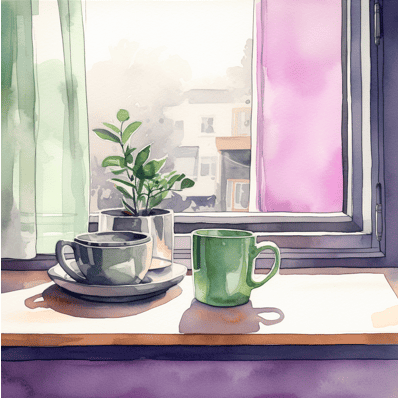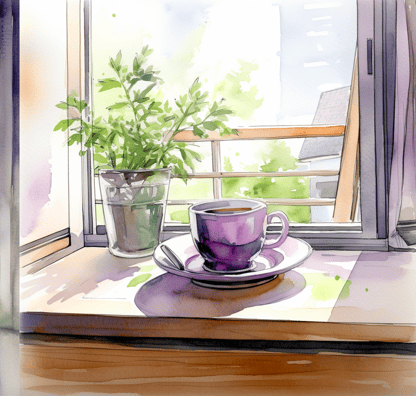
Don’t want to read the whole post?
Black tea can be beneficial for your skin. It contains antioxidants and anti-inflammatory properties that may reduce acne and promote clearer skin. Regularly drinking or applying black tea to your skin could improve its health and appearance.
ABOUT ME
Be beauty. Be plant-based!
As a former Registered Nurse and avid plant-muncher, I’m in love with how simple plant-based foods make it easy to be beautiful.

You’ll also love:
Matcha Magic: The Power of Green Tea for Acne-Free Skin
Bye-Bye Blemishes: Is Peppermint Tea Good for Acne?
How Long Does Black Tea Last? Keeping It Fresh
Hello, beautiful! I know you’re always on the go, but here’s something simple yet magical that might catch your eye. Is black tea good for acne? You’ll be surprised how this common pantry item can be a benefit for healthy skin.
Why You Should Add Black Tea to Your Beauty Routine
First things first, let’s talk about the different types of tea out there. You’ve probably heard of green tea and herbal tea, but black tea holds its own special charm, especially when it comes to skin health. Rich in flavor and benefits, black tea fights off free radicals that can harm your skin. Free radicals are like tiny thieves that steal good stuff from your skin cells, and black tea’s powerful antioxidant properties act like guards that chase these thieves away.
Does Black Tea Help With Acne?
Great question, lovely! If you’re battling with acne breakouts, black tea might just be the ally you need. One of the major ways black tea can help is through its antimicrobial properties, which help fight off the bacteria that cause acne. When it comes to oil production, black tea has got you covered. It works to control sebum production by targeting the sebaceous glands, reducing the oils that often lead to acne.

Tea, especially black and green varieties, contains certain compounds like tannins and polyphenols that have astringent properties. These substances can help shrink your skin’s pores, which can reduce the amount of oil, or sebum, that your skin makes. When your skin’s sebaceous glands produce less sebum, there’s a smaller chance of your pores getting clogged, which helps in controlling acne breakouts.
In addition, the antioxidant properties in tea can help balance the skin’s natural oil production by reducing inflammation and fighting off bacteria. This leads to a more balanced level of oil on the skin, further helping to control acne.
What about hormonal acne, you ask? While black tea can’t directly balance your hormones, its ability to regulate oil production can lessen those pesky hormone-induced breakouts. In short, while it might not be a one-stop solution, black tea does have qualities that can help fight acne and promote healthy skin.
Can Black Tea Help Your Skin?
Black tea is more than a comforting drink; it’s a go-to for gorgeous, healthy skin. How so?

Antioxidants Galore – Black tea is packed with antioxidants that protect against skin-damaging free radicals.
Soothes Redness – Its anti-inflammatory properties help reduce skin redness and swelling.
Fights Skin Infections – Thanks to antimicrobial properties, it’s effective against skin infections.
Sun Protection – Black tea provides a shield against harmful ultraviolet radiation, reducing the risk of skin cancer.
Brightening Effects – Regular drinking may help brightens dull skin and lighten dark spots, improving skin pigmentation.
Anti-Aging Benefits – Integrating black tea into your daily routine helps combat UV damage and the visible signs of ageing.
Embrace Regular Use: Make the most of black tea benefits for skin by adding it to your regular skin care regimen.
Black Tea on Your Skin: A How-To Guide
So you’re probably wondering, “Should I use black tea on my skin?” The answer is a resounding yes! Here’s how to do it: Brew a cup of black tea with hot water and let it come to room temperature. Then, dip a cotton ball into the tea and gently apply it to your face or problem areas. Wondering how long to leave black tea on the skin? About 10 to 15 minutes should do the trick. This method targets sebaceous glands, helping to control sebum production and giving you that clear, beautiful complexion you desire.
But honestly, you’re better off just drinking the tea as we don’t know if the nutrients absorb when applied topically.
Drinking Black Tea for Beauty
But what if you love sipping tea as much as applying it? Can you drink tea if you have acne-prone skin? Good news, beautiful! Drinking black tea is probably even more effective for your skin. It helps regulate your sebaceous glands and controls sebum production, which can reduce acne. However, keep an eye on how much caffeine you’re taking in, as too much can be counterproductive. Moreover, black tea helps your blood vessels function better, which can give your face that sought-after glow.

You may also like: Caffeine Overdose: Is All Black Tea Caffeinated?
Other Teas for Your Skin
If you’re curious about other options, you’re in luck! There are several teas that can beautify your skin. White tea is a good choice, offering similar antioxidant properties as black tea but with less caffeine. Green tea extract is another superstar, rich in vitamin C and perfect for improving skin texture. Don’t overlook oolong tea and herbal tea either; they come with their own sets of benefits for a radiant complexion.
By exploring different teas, you’ll not only enjoy a variety of flavors but also a range of benefits that contribute to your beautiful skin.
Quick Tips and DIYs
Ready for some easy ways to make black tea a regular part of your beauty ritual? Let’s dive in! A simple face mask using black tea may assist with fine lines and oily skin. Just mix some brewed black tea with a bit of honey, apply it to your face, and let it sit for about 15 minutes before rinsing off. You can also add a splash of lemon juice for an extra kick of vitamin C. These simple hacks can help you look as beautiful on the outside as you feel on the inside.
FAQ: Is black tea good for acne?
Is it ok to put black tea on your face?
Yes, it’s generally safe to apply black tea to your face. Thanks to its antibacterial properties, black tea can help fight off skin issues and improve your complexion. However, it’s always a good idea to do a patch test first to make sure your skin doesn’t react badly.
Is it ok to drink black tea all day?
While black tea has numerous health benefits, it’s best not to go overboard. Drinking too many cups of black tea in a day can lead to too much caffeine intake, which might cause problems like jitteriness or trouble sleeping.
Why shouldn’t you drink black tea on an empty stomach?
Drinking black tea on an empty stomach can be harsh for some people. The acidity of the tea might cause discomfort or digestive issues. Plus, the caffeine can be stronger on an empty stomach, leading to potential jitters or heartburn.
Will I lose weight if I drink black tea every day?
Black tea can be part of a weight-loss plan because it may help speed up metabolism and reduce free radical damage. However, it’s not a magic potion. Weight loss also depends on your overall diet and exercise.
Is black tea good for your hair?
Absolutely, beautiful! Black tea comes from the camellia sinensis plant and has several benefits for hair. It can add shine and darken the hair color naturally. The tea also has antioxidants that protect your hair from free radical damage, making it healthier.
What’s the best tea for skin and hair?
While black tea offers many benefits, the best tea for skin and hair can vary depending on your needs. Green tea is also highly praised for its antioxidant benefits, and chamomile tea is often recommended for its calming effects.
How many cups of tea should I have for health benefits?
The answer can vary, but generally, 2-4 cups a day can offer you numerous health benefits without too much caffeine.
By understanding these frequently asked questions, you can make the best choices for your health and beauty, one cup of tea at a time.
References
- Miura K, Hughes MC, Arovah NI, van der Pols JC, Green AC. Black Tea Consumption and Risk of Skin Cancer: An 11-Year Prospective Study. Nutr Cancer. 2015;67(7):1049-1055.
- Saric S, Notay M, Sivamani RK. Green Tea and Other Tea Polyphenols: Effects on Sebum Production and Acne Vulgaris. Antioxidants (Basel). 2016;6(1):2. Published 2016 Dec 29. doi:10.3390/antiox6010002
- Truong VL, Jeong WS. Cellular Defensive Mechanisms of Tea Polyphenols: Structure-Activity Relationship. Int J Mol Sci. 2021;22(17):9109. Published 2021 Aug 24. doi:10.3390/ijms22179109